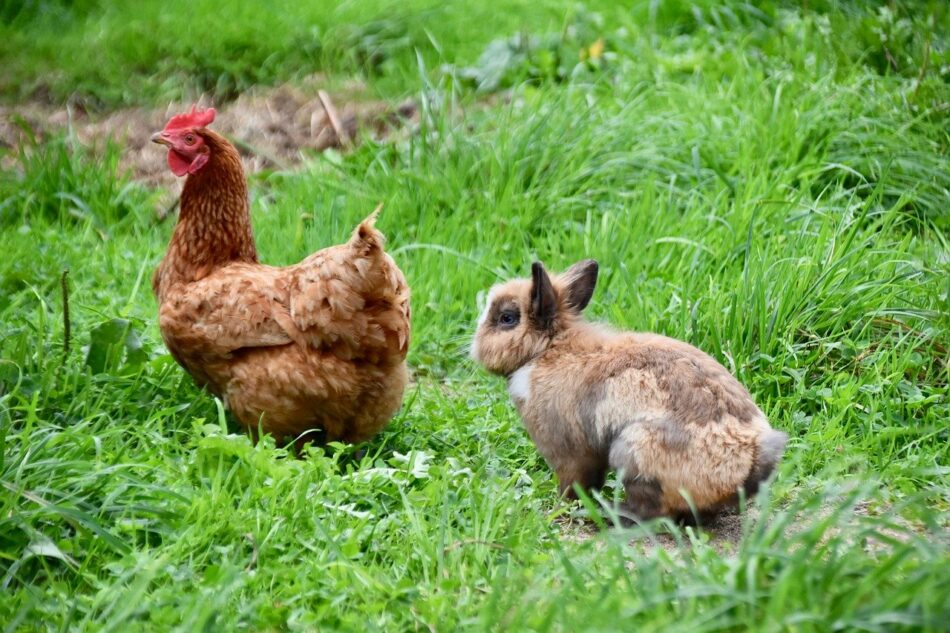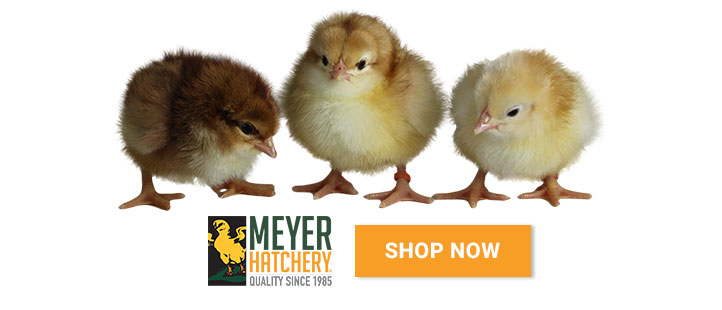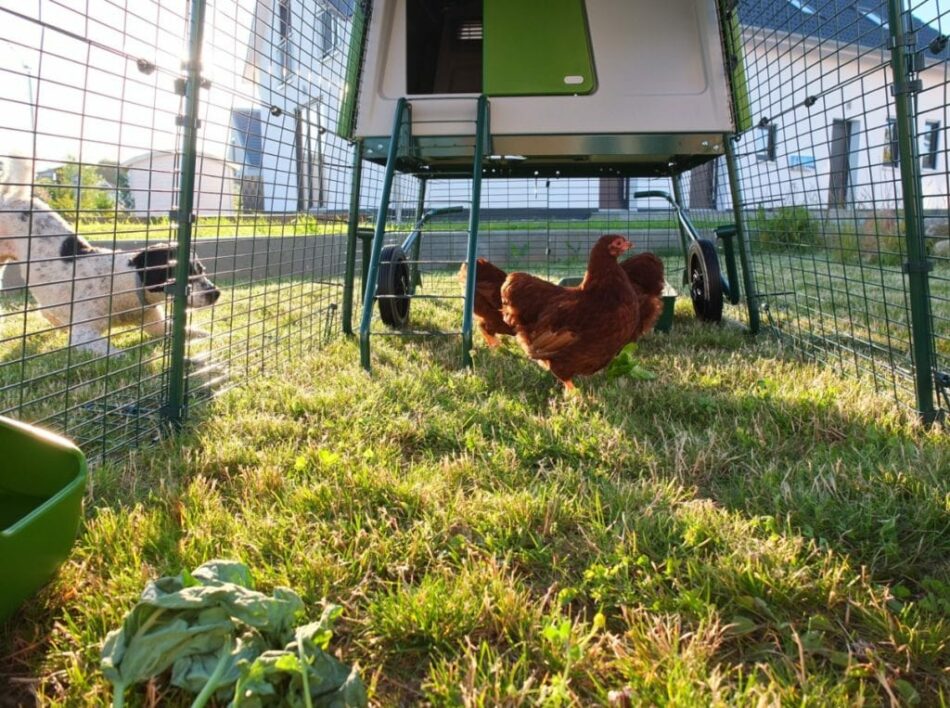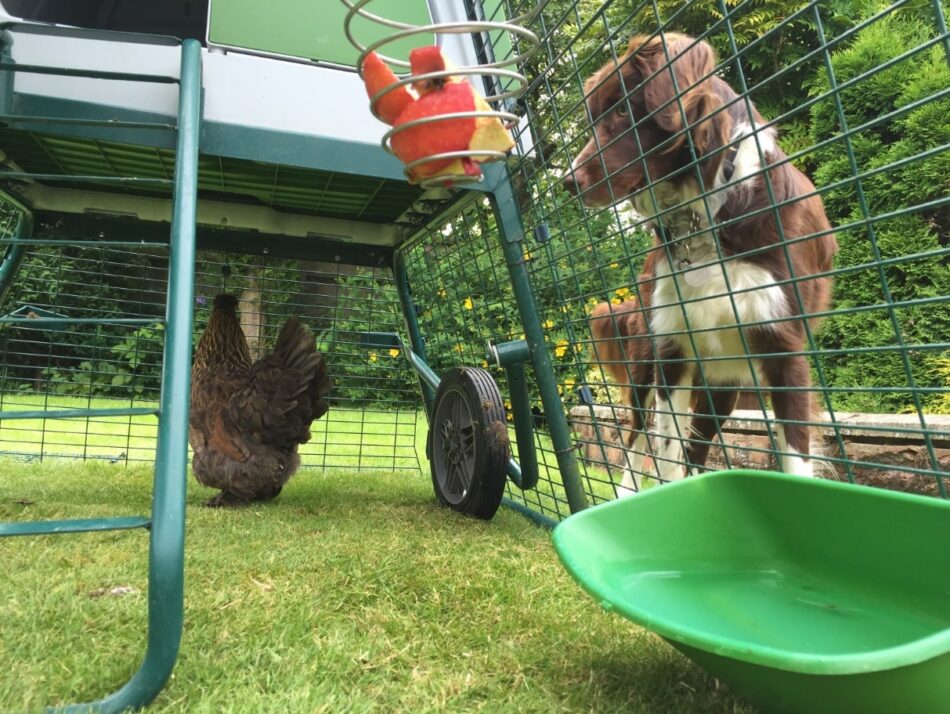Can I keep chickens with other pets?
You can keep chickens with other pets when the proper preparations and precautions are in place. Some pets like cats and dogs may have an innate prey drive that chickens can trigger, so it’s important to take introductions slowly to ensure success. With these tips, you’ll be able to confidently introduce your current pets to your chickens, or introduce new pets to your existing flock with confidence.
Keeping chickens with dogs
Dogs are the most common pets in the world, with millions kept as pets across the country. So, if you’re among the many dog owners, adding chickens to your family is possible once you consider your dog’s temperament and trainability.
Assessing your dog
If you’re a dog owner, the first thing to consider is their temperament. Different dog breeds may also react differently to birds as part of their nature. For example, breeds like Labrador Retrievers or German Shorthair Pointers may become easily excited around birds due to their natural hunting and retrieving drives. Other breeds that may have increased prey drives include:
- Beagles
- Sighthounds like Greyhounds or Borzois
- Dachshunds
Regardless of their breed, if your dog becomes excited or overly curious around small animals, their behavior will likely carry over to chickens. If your dog loses their mind over the birds at your backyard feeder, or drags you to investigate the park ducks on your evening walks, they’ll likely stress out your flock – and themselves.
Dogs without a prey drive or with little interest in birds will likely not pose a problem to your chickens, but all dogs react differently when new pets enter their territory. Usually, most dogs will adjust to the new backyard occupants just fine after an acclimation period. You will likely see your dog expressing interest in your chickens at first – hanging around and sniffing the coop. They may even express a desire to interact with your chickens through playful postures and behaviors. Understanding your dog’s body language around your chickens will help you determine what their relationship will be like.
Chickens are prey animals, and can be hurt easily. Dogs cannot play with chickens as they would with other dogs or even other pets. It’s important to teach your pup that chickens are fragile friends – not toys or something to hunt.
Teaching dogs to get along with chickens
Unless leashed walks make your dog overly excited, their first encounter with your chickens should be done with a dog collar and lead. Make sure their collar is tight enough that they don’t slip out, but not so tight that it’s uncomfortable. Walk your dog up to your chickens’ enclosure and let them sniff. Maintain a tight leash until you see your dog’s reaction, and allow the lead more slack slowly to reinforce good behavior.
Let your dog watch you spend time with your chickens. This should be done with your chickens in the safety of a strong walk in chicken run. If your dog does more than sniff or hang around the run, take a step back and approach their interaction from a different angle.
It could take several weeks for your dog to fully accept your chickens. Some other ways to help your dogs adjust to your chickens include:
- Setting up chicken fencing around the outside of your flock’s run for your dog to observe them at a distance.
- If your dog has a run or playpen, place it next to your chickens’ run and slowly decrease the distance over several days until they are side-by-side.
- Reward your dog with their favorite treats each time they are calm around your chickens.
Make sure to never leave your dog unattended with your chickens – especially in the beginning. Even if they can’t get into the run with them, an excited dog’s barking can easily stress your flock out.
Keeping chickens with cats
Cats are more difficult to train than their canine counterparts, and are decidedly less predictable in their behavior. But the good news is that most cats don’t see a large hen as potential prey the same way a dog might. Most cat owners will agree that their cats show little to no interest in their chickens. In fact, cats and chickens have a somewhat symbiotic relationship.
Birds and their feed attract rodents, which a cat would much prefer over your hens. So, when your cat is able to patrol your chickens’ surroundings, chances are good that any potential rodent problem will be nipped in the bud.
Some cats may show increased interest in your hens. This largely depends on your cat’s breed and temperament. Cats will pose a greater threat to chicks rather than grown hens, but by keeping your flock in a strong chicken coop and run, you’ll ensure they stay safe from your cat.
Keeping chickens with guinea pigs
It may be tempting to keep some cute cavies in with your chickens, but in reality it’s not wise. Chickens will likely pick on them, and with their short legs, guinea pigs can’t get away from them quickly. Their dietary requirements are also very different, and your chickens may eat your guinea pigs’ food in favor of their own, which means neither animal will be getting the nutrients they need. If you have cavies and want to house them near your chickens, it’s best for them to have their own guinea pig hutch and run.
Keeping chickens with rabbits
Rabbits on the other hand are fast enough to fend for themselves against chickens, and if raised together from a young age, can do well around chickens. Still, they require their own dietary needs and clean sleeping quarters. They don’t roost like chickens, so they’ll need their own burrowing space in the run or under the coop.
The easiest way to achieve this is by adding walk in chicken run partitions. This will allow you to create “rooms” for each species to ensure they all get what they need. You can open the partition doors to allow everyone to be together whenever you’d like, or create a third space as a common area.
Remember to try to give each species as much space as possible in their respective areas to make them feel safe and comfortable.

Chickens and other pets
Chickens can also mix happily with goats, and with female ducks (males will tends to bully them). Ironically, they do not mix with birds in an aviary. They will eat anything that falls to the aviary floor, but they will also happily peck the other birds whenever they can and may attract rats and mice, which will cause problems for the smaller birds.
If you live in a rural setting, you can keep chickens with other barnyard animals. Chickens mix happily with:
- Goats
- Sheep
- Cows
- Alpacas or llamas
- Pigs
- Female ducks, guinea fowl, peacocks, geese, or pheasants
Any other avian species kept with chickens should be docile and preferably female, as males can bully hens. Smaller birds like quail or pigeons will likely get pecked at by chickens, so it’s best to stick with larger birds as run-mates. Small pets like hamsters, gerbils, turtles, or frogs should never be kept with chickens – they will be pecked at and killed.
Omlet and your pets
Omlet has all of the pet products you need to keep your furry and feathered family members healthy and happy. Having multiple types of pets is exciting, and through our line of chicken coops, chicken runs, and walk in run partitions, you’ll be able to create a safe haven for all of your animals to enjoy. And, by knowing that Omlet products are protecting your flock, you can rest easy knowing that you’ve provided them with the best chicken housing solutions available.
This entry was posted in Budgies




